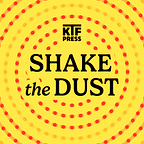Jonathan reads his essay, “Poverty and Shame: Learning Solidarity with My Younger Self,” that we published today at KTFPress.com.
Shake the Dust is a podcast of KTF Press. Follow us on Facebook, Instagram, Threads, and Twitter. Subscribe to get our newsletter and bonus episodes at KTFPress.com. Transcripts of every episode are available at KTFPress.com/s/transcripts.
Hosts
Jonathan Walton – follow him on Facebook and Instagram.
Our theme song is “Citizens” by Jon Guerra – listen to the whole song on Spotify.
Our podcast art is by Robyn Burgess– follow her and see her other work on Instagram.
Production, editing, and transcript by Sy Hoekstra.
Questions about anything you heard on the show? Write to shakethedust@ktfpress.com and we may answer your question on a future episode.
Transcript
[An acoustic guitar softly plays six notes, the first three ascending and the last three descending — F#, B, F#, E, D#, B — with a keyboard pad playing the note B in the background. Both fade out as Jonathan Walton says “This is a KTF Press podcast.” After a brief pause, the intro piano music from “Citizens” by Jon Guerra plays briefly and then fades out.]
Jonathan Walton: Welcome to this extra episode of Shake the Dust. I’m Jonathan Walton here to read the piece I just wrote that we just published at KTFPress.com. It’s called Poverty and Shame: Learning Solidarity with My Younger Self. Here we go.
My oldest daughter, Maia, has asked me several times, “Baba, why don’t you talk about your childhood?” I usually laugh it off and tell her one of the many stories about rural Virginia that I’ve canned over the years about killing snakes with a shovel or picking strawberries in a field with my mother and siblings so we could rent video games or buy groceries.
I can’t tell her about the racism, the infidelity, or the anger. I don’t want to talk about all the unknown numbers that called our house to collect money. I don’t want to explain that her fridge is always full because I remember when mine was empty, and I’m going to make sure she never feels that sense of lack. Learning that other kids had candy in their pantries and received gifts on days other than Christmas crumpled something inside of me when I was nine years old. I just don’t know if I can handle Maia seeing the part of her Baba which is still that child.
I don’t even know if she would be able to understand him. Her favorite sandwich includes a multi-grain baguette, smoked salmon, cucumber and fresh dill from a local artisanal place that calls itself a “workshop.” I don’t know how to explain to her what happens when you put a slice of American pasteurized process cheese food between two pieces of Merita bread in a microwave. It is salty and, for a short while, filling. I had that sandwich daily in my lunch box for years with air-popped popcorn. She’s got Pirate’s Booty in a reusable silicone lunch bag along with the rest of her carefully selected meal. She has never seen moldy bread in our house, let alone cut off the mold to eat the remainder.
I’ve hidden the traumatic parts of my childhood from her. I’ve been afraid and ashamed, so I’ve shared shallowly. The depths are there. I just prefer to keep them hidden.
But in therapy, I learned that emotional suppression prevents our feelings of joy and excitement just as much as those of pain and anguish. I can be shut off or I can be open. I cannot elect to feel only good feelings. I am either engaging with the wide spectrum of my emotions or compressing them to a narrow stoicism that stops me from truly connecting with my daughter because I am not connecting with myself. I became a performer for Maia, telling funny stories about country life, instead of giving her the tools to engage all of her identity and heritage.
I am trying to become less ashamed now, though I still have trouble journeying to the depths. I am not yet skilled enough at standing in solidarity with my younger, less financially fortunate self.
But I know it’s possible. Because my Momma never hid who we were from me or from herself, and that was a beautiful gift. She taught me how to enjoy yeast rolls with turkey gravy, even when that was our whole dinner for a week straight. She taught me how to make a fire and feel perfectly content with the world sitting next to it. She taught me how to talk with God while pacing and groaning when things were hard, knowing that God is pacing with me. If Momma wasn’t ashamed of where she came from or the life we had, who am I to shy away?
I have always seen the difficulties and complexities of my background. Now I am trying to focus on its wealth. I had community in abundance, surrounded by people who loved me. I had fresh air. I had trees and wildlife that I could identify on my beautiful, quarter-mile dirt road walks to the bus stop. I met the Jesus that got us through slavery, sharecropping, Jim Crow, and segregation. I must learn how to pass these generational riches to Maia because, though I can’t deposit them in a trust for her, they will outlast all the things in every vault in the world. God showed Momma how to do it, and he’s going to show me too.
[The song “Citizens” by Jon Guerra fades in. Lyrics: “And that you’re building a city/ Where we arrive as immigrants/ And you call us citizens/ And you welcome us as children home/ Where we arrive as immigrants/ And you call us citizens/ And you welcome us as children home.” The song fades out.]









